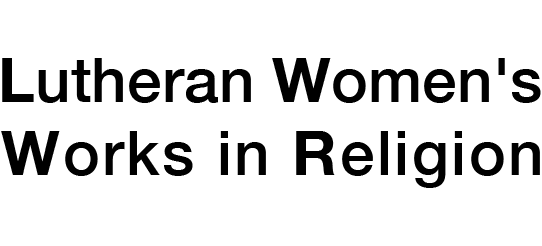Item Type: Books
THEOLOGY
Caryn D. Riswold Human Life in the Vision of God., Eugene, Oregon: Wipf and Stock (Pickwick Publications) 2006In order to adequately address the issues of atonement and christology, we must understand how it is that we think about the relationship between God and the human being. The way in which we understand and interpret the life and death of Jesus and his role within that relationship then impacts our theology of the sacraments, particularly the eucharist.
BIBLICAL STUDIES
Kathryn Schifferdecker Out of the Whirlwind: Creation Theology in the Book of Job., Cambridge, MA: Harvard University Press 2008Explores the creation theology of the book of Job, particularly the God speeches at the end of the book, and their relation to the rest of the book. Includes some reflection on ecological implications of Job‘s creation theology.
THEOLOGY
Carolyn Schneider I Am a Christian: the Nun, the Devil, and Martin Luther., Minneapolis: Fortress Press 2010This book explores a story that Martin Luther told to encourage people in despair. In the story a woman resists the devil‘s temptation to despair with the words “I am a Christian.” Part one of the book examines what that confession meant to Luther and why it was important to him. Part two investigates the woman‘s identity. Part three applies the story to modern forms of despair.
BIBLICAL STUDIES
Joy Schroeder Dinah’s Lament: The Biblical Legacy of Sexual Violence in Christian Interpretation., Minneapolis: Fortress Press 2007Studies the ways Christians have read six biblical narratives about sexual violence, using biblical commentary, homilies, and devotional writings as a window into the history of the church’s attitudes about rape. Schroeder analyzes the patterns of Christian interpretation, from the early church through the Reformation, and shows that traditions of interpretation are often more disturbing and horrifying than the texts themselves.
CHURCH HISTORY AND HISTORICAL THEOLOGY
Kirsi Stjerna Reading Christian Theology in the Protestant Tradition., In Stjerna: Sixteenth Century Christiantity. eds. Kelly M. Kapic and Melanie Webb. T&T Clark, ForthcomingA textbook, introducing central theological texts and their significance for/in the Reformations.
A textbook, with introductions and notes to Luther‘s texts, in light of Luther‘s theological development, exegetical work, and Jewish history
THEOLOGY
Kirsi Stjerna Spirituality: Towards a 21st Century Lutheran Understanding., eds. Kirsi Stjerna and Brooks Schramm. Minneapolis: Fortress Press 2004A faculty book exploring different ways spirituality is thought and modeled in seminary education – editing, and two articles.
In No Greater Jewel Luther’s teaching of baptism is unfolded in light of specific issues arising around Lutheran practices and understanding of baptism today. Includes questions for discussion.
CHURCH HISTORY AND HISTORICAL THEOLOGY
Kirsi Stjerna Reformaation Naiset., trans. Stjerna, Kirsi Helsinki: Kirjapaja. 2011A new edition, in Finnish, of the textbook Women and the Reformation.
A study of Luther‘s theology of baptism, in light of historical, spiritual and ecumenical concerns, for a general audience, with study questions.

